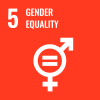Charsadda, 7 December 2023 – In the heart of a refugee camp in Charsadda, northwestern Pakistan, Basnoora*, a 35-year-old Afghan woman with disabilities, has experienced firsthand the physical and mental health consequences of the lack of suitable menstrual products.
She often suffers from infections and illnesses due to the low-quality materials she is forced to use and unhygienic conditions in the compound where she lives, poverty and stigma.
The International Organization for Migration (IOM) and its implementing partner in Pakistan, Blue Veins, are working to preserve the dignity of women and girls, whose vulnerabilities are exacerbated by the fact they are displaced, and to mitigate the risks of gender-based violence (GBV).
Basnoora and hundreds of women and girls have received culturally appropriate Dignity Kits, a pack containing essential hygiene supplies, including soap, a multi-purpose garment, reusable menstrual pads, underwear, laundry detergent and buckets. They also received a whistle and solar flashlight, an acknowledgment of the possible dangers women and girls face, particularly at night.

Women share their concerns about their menstrual hygiene and explain their difficulties in accessing adequate hygiene products. Photo: Blue Veins
Millions have fled Afghanistan to Pakistan over the past four decades due to violence and instability, dividing families, and causing a breakdown in social and traditional protection systems. The complexities of the protracted Afghan crisis, coupled with a rise in gender-based violence in the wake of devastating 2022 floods in Pakistan – a country with a high prevalence of GBV – have all increased the risks faced by displaced women and girls.

Basnoora, an Afghan woman with a physical disability, receives a dignity kit during the distribution session in Charsadda. Photo: Blue Veins
It is particularly crucial to address GBV in these circumstances where at-risk women and girls are often targeted for abuse, exploitation, and violence due to their gender, age and status in society. Their health is easily compromised, their mobility restricted, and they become increasingly isolated. One element of the broader response to the protection needs of women and girls is ensuring access to essential lifesaving services and products such as hygiene products.
The lack of these products in the province of Khyber Pakhtunkhwa is a major issue, forcing them to use unsafe substitute materials such as rags, newspapers, or other types of unhygienic clothes, which cause infections and other health issues. Additionally, within the cultural context of both Pakistan and Afghanistan, menstruation is taboo and highly stigmatized, which exacerbates GBV by perpetuating harmful stereotypes and limiting mobility and opportunities for women and girls.

IOM’s partner, Blue Veins, explains how to use each item in the dignity kits that were distributed to Afghan women and girls in Pesha. Photo: Blue Veins
The distribution of dignity kits was a great relief for 39-year-old Surriya Khanum* who attended the awareness sessions on Menstrual Health and Hygiene Management (MHM) and GBV with two female family members. The reusable sanitary napkins in the kit will sustain them for six months.
“These reusable sanitary pads have been a blessing,” says Surriya. “Not having to worry about buying them every month for the next half year is a huge relief. It saves us a lot of money and gives us a sense of freedom.”
Overall, 4,000 Afghan women and adolescent girls were provided with information, education and communication materials on MHM in Pashto, Dari and Urdu languages, enhancing their understanding of menstrual hygiene and dispelling prevalent misconceptions about menstruation.
The sessions also aimed at mobilizing Afghan men and boys to break down the stigma surrounding menstruation and promote gender equality; 245 Afghan men were engaged through awareness raising and information sessions at the community level.
Like many other men, Akhtar Ali*, a 49-year-old father living in Peshawar, the largest city in the province of Khyber Pakhtunkhwa, initially found the concept of menstruation hard to talk about. After attending the session, he came to understand it is a natural biological process, debunking age-old stigmas.

Awareness raising session on MHM and GBV being conducted with Afghan women and girls in Refugee Village in Peshawar. Photo: Blue Veins
MHM and GBV are intrinsically linked. In many contexts globally, menstruation is seen to signal that girls are eligible for marriage and childbearing which leaves them exposed to a host of violations, including child marriage and sexual violence. The silence, myths and taboos around the subject of menstruation hides the painful experience of women and girls.
Social and cultural norms linked to women’s menstrual experience can lead to economic violence and deprivation. For example, communities prohibit women and girls from participating in societal life and activities such as livelihoods and/or attending school, which deprive them from crucial social and economic opportunities. Additionally, GBV can lead to inadequate management of menstrual hygiene, and this can in turn can increase the risk of GBV.
Addressing GBV and MHM together is crucial to breaking this cycle. By investing in the community by providing knowledge, awareness, and access to safe and affordable menstrual products and hygiene education, the management of menstrual hygiene has improved, which in turn reduces the risk of GBV. Similarly, by addressing GBV, safer and more dignified environments are created for MHM.

Awareness raising session with male Afghan community members on menstrual hygiene and de-stigmatizing the topic among the community. Photo: Blue Veins
The health sector plays a pivotal role in managing and reducing the risks of GBV in all settings including those of protracted displacement. IOM’s work with displaced people in Pakistan has changed community perceptions, de-stigmatized taboo topics, raised awareness and reduced the risk of GBV.
Investing in interventions that address GBV is essential. It improves the health and well-being of displaced populations, restores and maintains basic human rights, and as a public health measure, reduces the risk of unnecessary illnesses and deaths.
*Names of individuals have been changed to protect their identity. Text by
Ashereen Jessy Kanesan, Programme Officer for Gender-Based Violence at IOM Pakistan.


